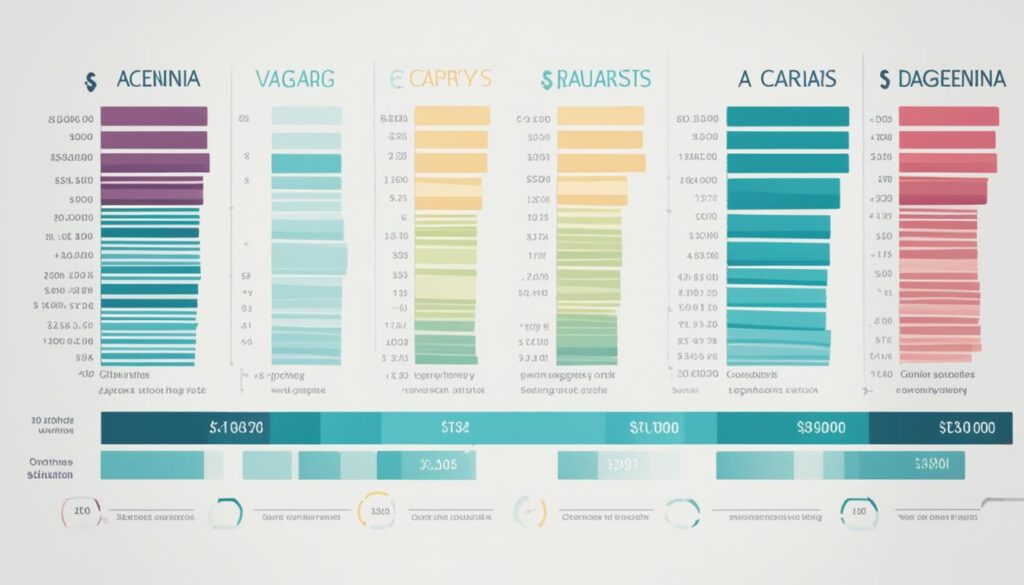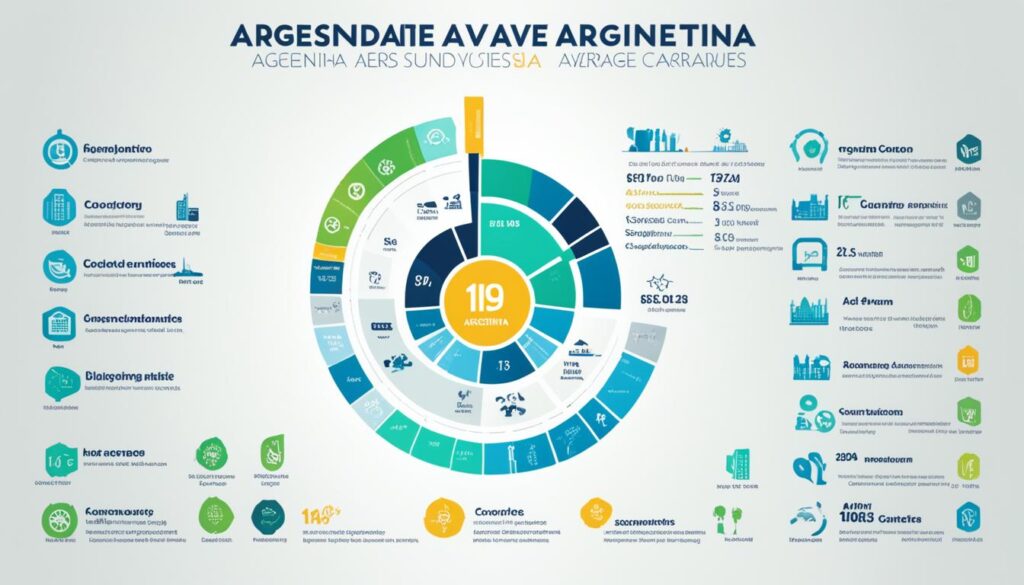The average salary in Argentina is a crucial indicator for understanding the nation’s economic framework. In 2025, the average monthly salary is approximately 374,320 ARS (around USD 425), reflecting significant fluctuations influenced by various economic elements. This extensive report will delve into the latest Argentina salary data, emphasizing how formulations of wages are affected by factors such as industry, experience, and education. For individuals considering employment options or policy-making in Argentina, these insights into average wages in Argentina are invaluable, as they unravel the complexities of the labor market in the country. Furthermore, the analysis encompasses regional differences, industry-specific salaries, and prevailing minimum wage regulations, ultimately serving as a complete guide for interested stakeholders and job seekers alike. More detailed information on this subject can be found at this link1.
Key Takeaways
- The average salary in Argentina for 2025 is estimated at 374,320 ARS.
- Economic stability, industry, and education directly impact salary levels.
- Regional disparities significantly influence average wages.
- Minimum wage in Argentina currently stands at 69,500 ARS per month.
- Healthcare professionals typically earn some of the highest salaries in the country.
- The gender wage gap persists, with women earning significantly less than men.
Average Salary Overview in 2025
The job market in Argentina is significantly shaped by the ongoing economic situation, providing a comprehensive view of salary trends and expectations for 2025. The Average Salary in Argentina is a critical point of reference for employees, employers, and job seekers alike in understanding their place within the Argentina job market analysis.
Current Average Monthly Salary in Argentina
As of 2025, the current average monthly salary in Argentina is approximately 374,320 ARS, which is about USD 425. This figure underscores the economic challenges, including inflation and currency fluctuations, that greatly impact the average income in Argentina and the purchasing power of its workforce2. Notably, the average income has seen fluctuations over the years; for instance, in 2023, the monthly average was considerably lower at around ARS 45,200, translating to about USD 1992.
Comparison with Previous Years
A thorough salary comparison Argentina showcases how wage figures reflect economic conditions over time. Between the previous years, Argentina’s salaries have fluctuated due to economic instability, providing a detailed perspective on the evolution of earnings. The average salary experienced a notable decrease in previous years, reinforcing the necessity for effective strategies in analyzing market trends and socio-economic factors affecting the labor market. The continual changes call for ongoing evaluation and adaptation, particularly when considering the broader context of salaries across the region and specific sectors.
| Year | Average Monthly Salary (ARS) | Average Monthly Salary (USD) |
|---|---|---|
| 2023 | 45,200 | 199 |
| 2025 | 374,320 | 425 |
Understanding these trends is essential for navigating the Argentina job market analysis effectively.
Regional Differences in Average Salary

In Argentina, regional salary differences play a crucial role in understanding the overall economic landscape. Each region reflects unique attributes influenced by local economies, industries, and living costs. Insights into the average salary in Argentina reveal significant variations across major areas such as the North, Central, and Patagonia regions.
North Region Salary Insights
The North region of Argentina features a diverse economic structure largely dominated by agriculture and tourism. Average wages in cities such as Salta and Jujuy hover around USD 800 per month, indicating the lower salary levels characteristic of this area. The cost of living is relatively low compared to other regions, which helps ease financial strains despite lower average wages.
Central Region Salary Trends
In contrast, the Central region, which includes Buenos Aires, boasts much higher average salaries. Professionals in this area can expect to earn between USD 1,200 and USD 2,000 monthly, reflecting the well-developed economy comprising finance, technology, and diverse industrial sectors. These Central Region salary trends showcase the importance of specialization and expertise in driving income levels.
Patagonia Region Salary Overview
The Patagonia region stands out as a high-paying area driven by its thriving oil and gas industry. Average wages in this part of Argentina often exceed USD 2,500 monthly, attracting skilled professionals seeking better opportunities. As a result, the region is rapidly becoming known for its competitive salaries, solidifying its position within the overall Argentina salary data framework.
Common Industries in Argentina and Their Average Salaries

The job market in Argentina features a variety of industries, each contributing to the overall economy with different compensation levels. Understanding these dynamics is crucial for anyone navigating the Argentina job market analysis. This section highlights key sectors and their corresponding average salaries as observed in recent trends.
Finance and Banking Sector
The Finance and Banking Sector remains one of the higher-paying industries in Argentina, with an average annual salary approaching USD 45,000. The demand for skilled professionals such as financial analysts and accountants continues to grow, especially in a fluctuating economic environment.
Technology and IT Industry
Salaries in the Technology and IT Industry average around USD 40,000 annually. This growth suggests a promising future for tech workers, reflecting the increased necessity for specialization in cybersecurity roles, which is expected to reach $2.35 billion by 20293.
Healthcare Sector Salary Analysis
The Healthcare Sector shows varied salaries, with an average annual income of about USD 35,000. This data highlights the essential roles that healthcare professionals play in society, even amidst economic challenges affecting income levels across all professions as noted in previous studies.
Manufacturing Industry Wages
In the Manufacturing Industry, annual salaries range from USD 30,000 to USD 50,000 depending on specific job roles and qualifications. This range indicates the sector’s critical impact on the overall economic infrastructure of Argentina, with many skilled labor opportunities available.
Tourism and Hospitality Salary Trends
The tourism and hospitality sector averages annual salaries between USD 25,000 and USD 45,000. This industry is vital for Argentina, especially in regions that heavily depend on tourism, although it may experience seasonal fluctuations affecting earnings.
| Industry | Average Annual Salary (USD) |
|---|---|
| Finance and Banking Sector | 45,000 |
| Technology and IT Industry | 40,000 |
| Healthcare Sector | 35,000 |
| Manufacturing Industry | 30,000 – 50,000 |
| Tourism and Hospitality | 25,000 – 45,000 |
In summary, the average wages in Argentina differ significantly across industries, showcasing the varying economic landscapes and opportunities available to job seekers in the country4.
Minimum Wage Regulations in 2025
As of March 1, 2025, the minimum wage in Argentina is set at 202,800 ARS per month, equivalent to approximately USD 230. This significant regulation aims to establish a baseline standard of living for workers across various sectors, showcasing a commitment to improving wage equity in the country. It’s essential to understand these Minimum Wage Regulations in 2025 to grasp the shifts in the Average Salary in Argentina and their potential impacts on employment practices5.
The current minimum wage represents an increase from the previous year’s rate of ARS 156,000 per month, highlighting the government’s ongoing efforts to combat economic disparities and ensuring fair compensation for all workers6. Employment laws in Argentina dictate that all workers under a dependency relationship are protected by specific labor regulations, and employers are mandated to adhere to minimum statutory terms concerning remuneration and working conditions5.
These advancements indicate a responsive approach in aligning compensation frameworks with the rising cost of living and economic conditions. For more detailed insights on this topic, including guidelines related to payroll processes and employment laws, you can explore more through Playroll’s comprehensive guide on hiring in Argentina here.
FAQ
What is the average salary in Argentina for 2024?
How does the average salary compare to previous years?
What factors influence salaries in different regions of Argentina?
Which sector offers the highest average salaries in Argentina?
What is the average salary for IT professionals in Argentina?
How do healthcare salaries vary in Argentina?
What are the salary trends in the tourism and hospitality sector?
What is the minimum wage in Argentina for 2024?
Why is salary data important for job seekers?
How can I use Argentina salary data for employer analyses?
Source Links
- https://www.salaryexplorer.com/average-salary-wage-comparison-argentina-c10
- https://www.tecla.io/salaries/software-developer-salary-argentina
- https://www.nucamp.co/blog/coding-bootcamp-argentina-arg-argentina-cybersecurity-salaries-what-can-you-expect-to-earn
- https://en.wikipedia.org/wiki/Economy_of_Argentina
- https://iclg.com/practice-areas/employment-and-labour-laws-and-regulations/argentina
- https://www.skuad.io/employment-laws/argentina

Comments